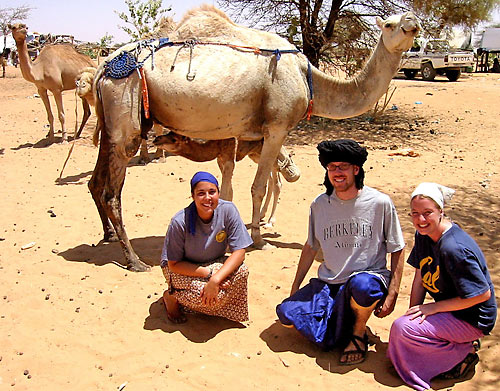I May Be African...
=== I May Be African… ===
Recently I had lunch at the home of another Peace Corps trainee, who is residing with the family of a local government official. After the meal we watched French television in the cool living room and sipped icy beverages. I told the host mother where I’m living, and she noted that there’s no electricity or running water in my neighborhood. “I may be African, but I could NEVER live like that,” she said. “How are you doing with it?” My actual answer: “fine, thanks.” My internal answer. “Well, I was doing just FINE with it until I realized that I could watch the Tour de France and drink sodas at your place! Thanks a LOT!”
=== Drawing A Crowd ===
Privacy takes a back seat to community in Mauritania. For example, as I write this, a dozen kids are standing around me asking me questions and laughing at me. Adults tend to leave you alone unless you address them, but the kids in Kaedi can be a rambunctious lot, not to mention disrespectful, obnoxious little“you know whats” from time to time. We deserve a bit of razzing, in my opinion, walking around like aliens in their world with strange clothes, contraptions, and languages. I’m working on ways to deal with the bad seeds, for example the ones at the river who dare stand two feet from your picnic and stare at your American tuna fish packets. “You’re bad!” “leave me alone” and the always charming “may God shorten your life” are good stand by’s, but I’m working on something along the line of “I’m going to talk to your father” to see if the fear of a beating gets them to leave me alone for a few minutes.
=== Greetings ===
One fact of life in Mauritania is a tightly knit community where a la Cheers “everybody knows your name.” In the developed world, most times you’re lucky to get a “eh!” from someone when you say hello. Here, when people greet, they really go for it.
Joe: Peace out, my friend!
Sally: Same to you!
J: Everything groovy?
S: Absolutely!
J: Good health?
S: Yeah, totally, thank God!
J: Work treating you well?
S: No problem at all!
J: The fatigue getting you down?
S: Not at all.
J: Everything ok with your trip?
S: Piece of cake, thank God.…
and then the reverse …Imagine what you’d say to someone you haven’t seen in years. Then imagine doing that every day with everyone. I’m getting used to it.
=== Analogies of the Day ===
Waiting for an e-mail to open at the Kaedi internet café is like watching a bad movie one frame at a time. Sending an email successfully feels like winning one of the rigged games at a carnival. Completing a bath in the average Mauritanian latrine grants you the same sense of relief that you get when you submit your tax return to the IRS. Doing “your potty business” successfully? Like getting your refund by direct deposit.
=== AIM Book Review ===
Dark Star Safari by Paul Thereux
Take a trip through Africa with one of America’s most arrogant contemporary writers. Sound like an enticing advertisement? Well, much like my last review (John MacEnroe’s You Cannot Be Serious), arrogance can cut both ways, and in Theroux’s case, it’s entertaining, and also obnoxious. Theroux is an accomplishedwriter (he has written 20 or so books including The Mosquito Coast, and that was a movie so he must be good...) and knows parts of Africa very well. In fact, he was a Peace Corps volunteer in the “early days” in Malawi, where he was kicked out for being friends with an enemy of the state. He ended up moving to Uganda and teaching for some time at Makerere University befriending a young professor who is today the country’s Prime Minister.
The premise of the book is simple, and almost suicidal: starting in Cairo, travel south to Cape Town without stepping onto a plane. No one in their right mind makes the trip between Ethiopia and Kenya, for example, overland. It's often interesting, and shocking to hear what he has to go through to successfully make it from A to B. But because of his in depth knowledge of Malawi and Uganda, thebook really shines during his various homecomings. Due to his ability to speak the languages and compare the standard of living almost two generations later, he’s able to draw insightful conclusions.
But his trips through the touristy parts of Egypt come off as trite (making fun of the habits of unsophisticated western tourists is boring, not tomention arrogant), although he is able to come up with some interesting stories in places he’s visiting for the first time. Hear about the sham stories of the Zimbabweans taking over white farms (some claim to be veterans to get the land but in fact never fought in any war) and you'll realize the complexity of the problems Africa faces. But solutions don't exactly abound in Dark Star. His advice seems to be stop all foreign aid programs immediately. Yes, that is one conclusion after reading what I call the unholy trinity of anti-development books (The Road to Hell, Lords of Poverty, Tropical Gangsters), but it's easy to say and would probably be worse than what we have today. It's worth a read, especially if you have a long trip coming up.


<< Home